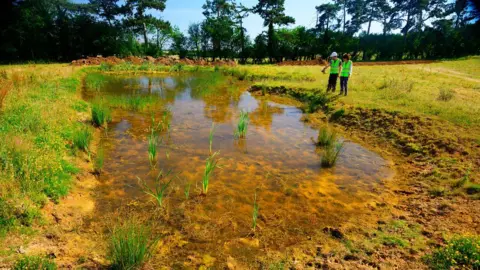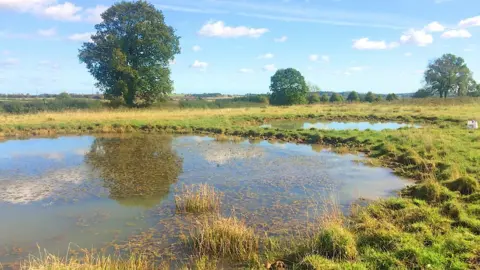Clean water ponds boosts rare wetland plants, say experts
 Freshwater Habitats Trust/PA Media
Freshwater Habitats Trust/PA MediaDigging ponds in the countryside can deliver "unprecedented" gains for nature, experts have said.
Freshwater Habitats Trust said 20 clean water ponds on farmland increased wetland plant species by 26%.
A nine-year project found rare plants almost trebled, while species that had gone extinct in the area returned.
The study tested a range of measures for improving freshwater habitat and wildlife in three catchment areas in Leicestershire.
The trust said it helped bring back rare species such as marsh arrowgrass, bristle club-rush and mare's tail.
The research team also claimed creating clean water ponds "could even reverse the ongoing declines in freshwater plant species".
The Water Friendly Farming project tested putting woody debris in streams, damming up ditches to create pools that slowed run-off, and building interception ponds to filter out nutrients and other pollutants.
Without such measures, the number of wetland plant species would have declined by 9% over the nine years of the project, the study said.
 Freshwater Habitats Trust/PA Media
Freshwater Habitats Trust/PA MediaPenny Williams, from the trust, said: "The gains we saw are unprecedented for freshwater and are, by a long way, the largest recorded improvements in freshwater diversity seen from adding land management measures to countryside landscapes.
"Our previous work had already shown that ponds were a secret treasure in the British countryside, however the scale of benefits from adding new ponds took all of us by surprise."
Dr Jeremy Biggs, director of the trust, said: "This is such an important result: freshwater biodiversity is under threat both across the UK and the globe."
The Environment Agency, Game and Wildlife Conservation Trust and the University of York were also involved in delivering the results.

Follow BBC East Midlands on Facebook, Twitter, or Instagram. Send your story ideas to [email protected].
